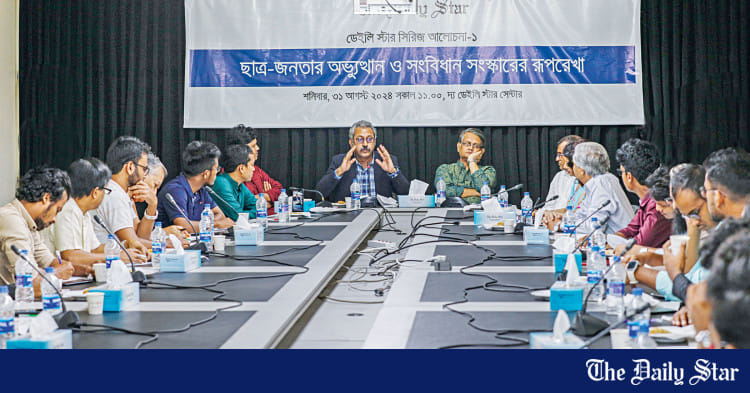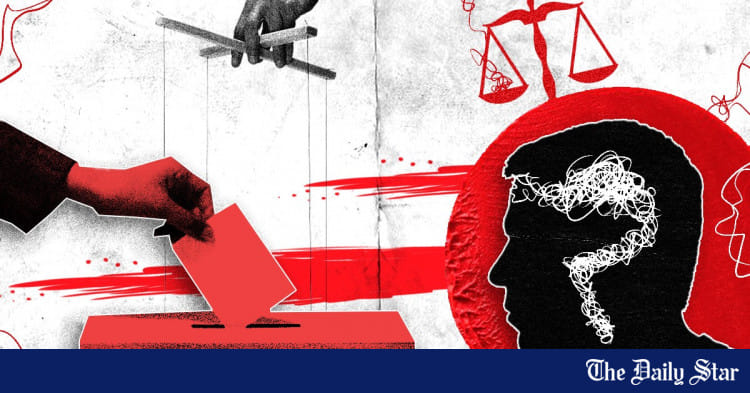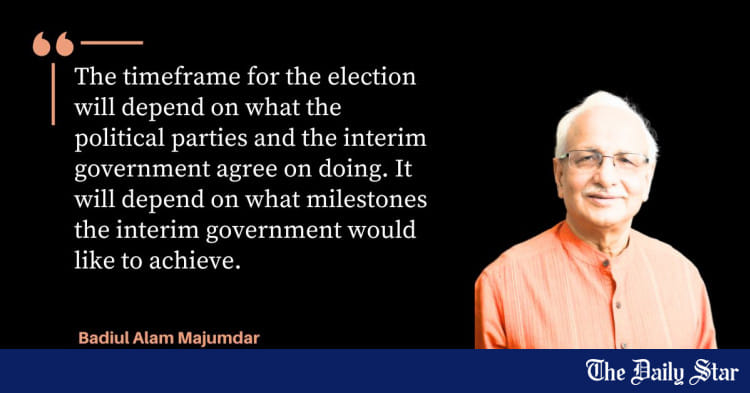Saif
Senior Member
- Messages
- 17,422
- Likes
- 8,377
- Nation

- Residence

- Axis Group


‘Reform constitution based on equality and social justice’
Speakers at a programme yesterday called for reforms to certain clauses of the constitution in line with the principles of equality, human dignity, and social justice -- key tenets of the Liberation War and the July revolution.
‘Reform constitution based on equality and social justice’
Speakers call for change in line with Liberation War, July revolution principles

The Daily Star organised the first part of a series of discussions titled “Mass-Student Movement and Constitution Reform Outline” at The Daily Star Centre in the capital yesterday. Photo: Star
Speakers at a programme yesterday called for reforms to certain clauses of the constitution in line with the principles of equality, human dignity, and social justice -- key tenets of the Liberation War and the July revolution.
They argued that political and constitutional reforms should be implemented in a way that prevents any future autocratic rule.
Advocate Arif Khan, a constitutional specialist, suggested that a party chief should not become the prime minister, and that a prime minister should not serve more than twice.
The Daily Star organised the first part of a series of discussions titled "Mass-Student Movement and Constitution Reform Outline" at The Daily Star Centre in the capital.
Khan said since the Liberation War, people have distanced themselves from political parties due to their disregard for the constitution, resulting in a failure to secure the rights promised within it.
He highlighted four key areas for amendment to improve the political environment: balancing power between the president and prime minister; ensuring the Election Commission's financial independence; revising Article 70 to allow MPs to vote against their party's decisions; and completely separating the judiciary.
Prof Ahmad Mostofa Kamal of Independent University said changing the constitution alone will not alter the nation's fate; rather, those who implement it must also change.
Ali Ar Raji, assistant professor at Chittagong University's Communication and Journalism department, emphasised that constitutional changes should reflect cultural and traditional values rather than being imposed from above.
Tamanna Akhter, a Dhaka University student, advocated for setting educational qualifications for parliamentary candidates and reinstating the caretaker government system.
Akram Hussain, a Dhaka University student and member of the Anti-Discrimination Student Movement's liaison committee, proposed that a political party or alliance should only form a government if it secures at least 51 percent of the vote.
Mehedi Sajib, a co-coordinator of the quota reform movement from Rajshahi University, suggested that the constitution should be made more accessible to help people understand their rights and powers.
Mahfuz Anam, editor and publisher of The Daily Star, underscored the need for both political and constitutional reforms.
He said one of the major reasons for the downfall of Sheikh Hasina is her arrogance.
He thanked students who were involved in the mass uprising, and said, "You have brought about a great revolution. Let there be no arrogance among you. Humility should be embedded in your character. The nation will always salute you for your contribution."
The discussion, conducted by The Daily Star journalist Imran Mahfuz, also featured contributions from Jahangirnagar University's Prof Shamima Sultana, Prof Mohammad Golam Rabbani, student Maliha Mannan, and academics and students from various institutions including Jagannath University, Prime Asia University, Dhaka College, Rajshahi Medical College, Darun Najat Madrasa, Independent University, United International University, BRAC University, and North South University.
Speakers call for change in line with Liberation War, July revolution principles
The Daily Star organised the first part of a series of discussions titled “Mass-Student Movement and Constitution Reform Outline” at The Daily Star Centre in the capital yesterday. Photo: Star
Speakers at a programme yesterday called for reforms to certain clauses of the constitution in line with the principles of equality, human dignity, and social justice -- key tenets of the Liberation War and the July revolution.
They argued that political and constitutional reforms should be implemented in a way that prevents any future autocratic rule.
Advocate Arif Khan, a constitutional specialist, suggested that a party chief should not become the prime minister, and that a prime minister should not serve more than twice.
The Daily Star organised the first part of a series of discussions titled "Mass-Student Movement and Constitution Reform Outline" at The Daily Star Centre in the capital.
Khan said since the Liberation War, people have distanced themselves from political parties due to their disregard for the constitution, resulting in a failure to secure the rights promised within it.
He highlighted four key areas for amendment to improve the political environment: balancing power between the president and prime minister; ensuring the Election Commission's financial independence; revising Article 70 to allow MPs to vote against their party's decisions; and completely separating the judiciary.
Prof Ahmad Mostofa Kamal of Independent University said changing the constitution alone will not alter the nation's fate; rather, those who implement it must also change.
Ali Ar Raji, assistant professor at Chittagong University's Communication and Journalism department, emphasised that constitutional changes should reflect cultural and traditional values rather than being imposed from above.
Tamanna Akhter, a Dhaka University student, advocated for setting educational qualifications for parliamentary candidates and reinstating the caretaker government system.
Akram Hussain, a Dhaka University student and member of the Anti-Discrimination Student Movement's liaison committee, proposed that a political party or alliance should only form a government if it secures at least 51 percent of the vote.
Mehedi Sajib, a co-coordinator of the quota reform movement from Rajshahi University, suggested that the constitution should be made more accessible to help people understand their rights and powers.
Mahfuz Anam, editor and publisher of The Daily Star, underscored the need for both political and constitutional reforms.
He said one of the major reasons for the downfall of Sheikh Hasina is her arrogance.
He thanked students who were involved in the mass uprising, and said, "You have brought about a great revolution. Let there be no arrogance among you. Humility should be embedded in your character. The nation will always salute you for your contribution."
The discussion, conducted by The Daily Star journalist Imran Mahfuz, also featured contributions from Jahangirnagar University's Prof Shamima Sultana, Prof Mohammad Golam Rabbani, student Maliha Mannan, and academics and students from various institutions including Jagannath University, Prime Asia University, Dhaka College, Rajshahi Medical College, Darun Najat Madrasa, Independent University, United International University, BRAC University, and North South University.








